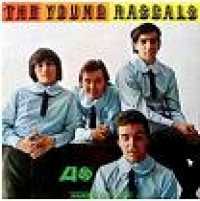This expressive act, one of America's finest pop/soul ensembles, made its debut in a New Jersey club, the Choo Choo in February 1965. Felix Cavaliere (29 November 1942, Pelham, New York, USA; organ/vocals), Eddie Brigati (b. Edward Brigati Jnr., 22 October 1945, Garfield, New Jersey, USA; vocals/percussion) and Dino Danelli (b. 23 July 1945, Jersey City, New Jersey, USA; drums) were each established musicians on the city's R&B circuit, serving time in several popular attractions, including Joey Dee And The Starliters. It was here that the trio encountered Gene Cornish (b. 14 May 1946, Ottawa, Canada; vocals/guitar), who became the fourth member of a breakaway act, initially dubbed Felix And The Escorts, but later known as the Young Rascals. The quartet signed to Atlantic Records and enjoyed a minor hit in 1965 with "I Ain't Gonna Eat Out My Heart Anymore" before securing a US number 1 the following year with the energetic "Good Lovin'".
Despite a somewhat encumbering early image - knickerbockers and choir boy shirts - the band's soulful performances endeared them to critics and peers, earning them a "group's group" sobriquet. Now established as one of the east coast's most influential attractions, spawning a host of imitators from the Vagrants to Vanilla Fudge, the Young Rascals secured their biggest US hit with "Groovin'" (written, like much of their material from this point onwards, by Brigati and Cavaliere). This melancholic performance became an international hit, signalling a lighter, more introspective approach, and although Brigati was featured on the haunting "How Can I Be Sure", a US Top 5 entry, Cavaliere gradually became the band's focal point. In 1968 the band dropped its "Young" prefix and enjoyed a third US number 1 with "People Got To Be Free". An announcement that every Rascals live appearance must also include a black act enforced their commitment to civil rights, but effectively banned them from southern states.
The quartet later began exploring jazz-based compositions, and although remaining respected, lost much of their commercial momentum. Brigati and Cornish left at the end of 1970, and although newcomers Buzz Feiten (b. Howard Feiten, USA; guitar), Ann Sutton (vocals) and Robert Popwell (drums) contributed to two albums for Columbia Records, Peaceful World (1971) and The Island Of Real (1972), the Rascals were clearly losing momentum and broke up in 1972. Cavaliere then enjoyed a moderate solo career while Danelli and Cornish formed Bulldog and Fotomaker. The three musicians were reunited in 1988 for an extensive US tour before disbanding once again. Cornish and Danelli formed the New Rascals in the following decade, while Cavaliere toured with his own line-up under the moniker Felix Cavaliere's Rascals. The original line-up was inducted into the Rock And Roll Hall Of Fame in 1997.
Source: http://www.oldies.com/artist-biography/The-Young-Rascals.html
